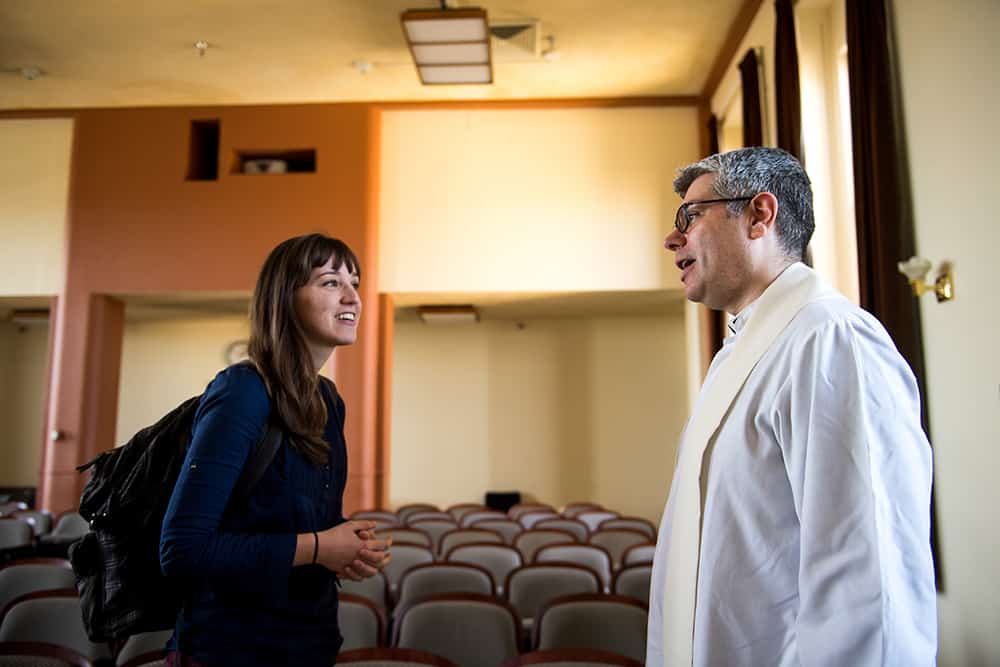With abortion and contraception deemed as necessary practices in the medical field, and now with the legalization of physician-assisted suicide in Colorado, the healthcare field is not friendly to the Catholic teaching of defending natural life to natural death — or those who believe and practice it.
It’s particularly a challenge to medical students, who may be required to learn about or witness practices that conflict with Catholic teaching, and deal with difficult professors and colleagues.
But that’s not stopping Catholic medical students from pursuing the field, where they can be a witness to others. In fact, it requires a deeper faith life and relationship with Jesus Christ, according to the University of Colorado Anschutz Medical Campus chaplain, Father Angel Perez-Lopez.
“Sometimes the difficulties they encounter motivate them to go deeper in their faith, which isn’t a bad thing,” Father Perez-Lopez said.
Father Perez-Lopez and his co-chaplain, Father Luis Granados, provide Masses on campus, as well as confessions, advice and spiritual direction. They also host a once a month event where they discuss ethical questions with students.

“Some of the issues are with the beginning of life and the end of life, basic virtues needed for healthcare, difficult scenarios, and the meaning of human suffering and sickness,” Father Perez-Lopez said. “We also talk about the false notion of autonomy of life as well as euthanasia and assisted suicide. Human life is everything.”
Difficult scenarios dealing with the dignity of human life are many even in the classroom, both from teachers and fellow classmates. But it’s also an opportunity to witness to the faith.
“We had a representative from Planned Parenthood to teach on ethics. The whole time, I held and prayed a rosary,” said physician assistant student at CU Anschutz, Catie Bettendorf. “During that class, God provided opportunities to talk to my classmates about my beliefs and why. It really comes down to being open to God’s will and asking Him to provide opportunities to share him with others.”
“In the medical field, students are taught that Natural Family Planning (NFP) methods have a 25% failure rate,” Bettendorf added. “This is of course false, and the data was gathered in misleading manner. I share journal articles with my classmates giving the actual data and the other methods. It has also prompted good discussion with peers who do not understand why I do not want to use birth control.”
Clinical rotations are another opportunity where students may encounter difficulties and provide a witness to the faith, says general medicine student at CU Anschutz, Catherine Waymel. Clinicals don’t start for another couple years for her, but she plans to be honest about her beliefs to both supervisors and patients.
“[I’ll handle it by] being forthright and just saying, ‘This is my situation, I conscientiously object,’ which is still acceptable in the medical field. And being forthright with patients,” Waymel said. “Just being honest and saying it is the best way to approach it. I expect an uphill battle, but I also can’t [be a health professional] without [my faith].”
We need physicians and providers who are also Catholic and believe life has value… Persecution shouldn’t be a deterring factor. It’s necessary so we can continue having providers who value life. It’s also a vocation, and every vocation has its challenges.” – Catherine Waymel, general medicine student at CU Anschutz
But to have a steadfast response to difficulties in the medical field requires a solid faith community, a life of prayer and a deep relationship with Christ, Bettendorf and Waymel said. Both are members of the Catholic Medical Association student chapter on campus, which provides Catholic students a place of solidarity and support.
“Our class is really fortunate — we have a lot of Catholic students and they’re very involved,” Waymel said. “I can’t help someone through suffering if I’m running from my own suffering…I can’t do it without a relationship with Christ. That group has helped a lot too, to know that I’m not the only one.”
“Without a relationship with Christ, there is no way I could stay faithful in this field,” Bettendorf said. “Each morning, I read the daily readings and offer my day to God. Sunday Mass, daily Mass when I can, reading good Catholic books and weekly adoration are crucial for me.”
Despite the challenges of the healthcare field in a culture that does not support the dignity of life, both Bettendorf and Waymel pursue their careers with confidence and encourage those similarly called to not be afraid.
“He made it abundantly clear I was supposed to be in healthcare, in Colorado, and he continues to reaffirm almost daily,” Bettendorf said. “There is a need for Catholic healthcare providers, and my desire and skillset aligns with God’s to meet that need. It is challenging but it is God’s will, and that is what ultimately fulfills us.”
“We need physicians and providers who are also Catholic and believe life has value. We’d very quickly have trouble finding someone who wouldn’t persuade a mother of two kids to avoid having more children,” Waymel said. “Persecution shouldn’t be a deterring factor. It’s necessary so we can continue having providers who value life. It’s also a vocation, and every vocation has its challenges.”
Father Perez-Lopez encourages students, or those interested in pursuing the field, to remember the true meaning of human suffering, which is so closely encountered as a professional, and to be unafraid if the Lord calls them to serve people in this way.
“At the core of problems people in this study face is the redemptive meaning of human suffering — we’ve lost that. To die, to be sick, to be handicapped, doesn’t make sense. Jesus gives suffering meaning,” Father Perez-Lopez said.
“I repeat, ‘Do not be afraid.’ The Lord has conquered the world…I would encourage them to be very well grounded in their faith and take this position [in the field] as an opportunity to rediscover and deepen your faith.”




